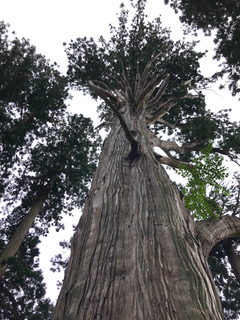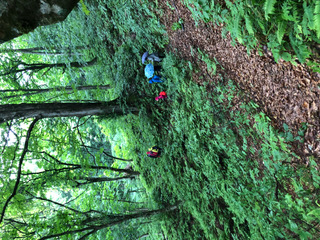Forest Bathing, a unique experience
- At June 20, 2021
- By admin
- In Annes Letters
 0
0
Dear Family and Friends,
Several months ago, a friend sent me an article about “Shinrin Yoku” (森林浴), or “Forest Bathing” here in Japan. It was a very idealized account of people immersing themselves in nature, releasing all their stress, and returning to their daily lives feeling rejuvenated and whole. Although I agree with the concept, and each morning practice a form of “Shinrin Yoku” with my one brave tree, I must admit I laughed at the time. Many of the Japanese I know say they love nature, but cut down trees with abandon, shriek if a fly passes by, and choose a blacktop parking lot over a home garden or a shopping mall to replace rice paddies. But the other day a friend who owns a travel agency asked me to please join her “Immerse Yourself in the Energy of Trees” tour. She needed another member to make the trip viable. I agreed to go, even though I prefer private trips to group outings.
We went to the Mogami area of Yamagata Prefecture. It is renowned for its natural beauty, where for centuries humans have blended seamlessly with the natural world. High mountains surround lush valleys with small villages and numerous fields of rice, garlic, and soba. Grandmas in big straw hats bend over their vegetable gardens, while men work diligently to keep their farms humming smoothly.

That region served the elegant Kyoto area for hundreds of years with its safflower and silk. It is more humble now, but still boasts spa towns, the Mogami River, and a large cedar forest in its center. That is where we were heading.
Our group consisted of seven women, some young, some old, most in between. The rented bus was small, but we could social distance easily. Ito San, the tour leader, told everyone not to panic with me there. She reassured them that I understood enough Japanese to hold a conversation. I smiled and said nothing.
Our first stop was at a small shrine nestled between rice paddies. It was called “Isurugi Shrine” (石動神社), which translated literally means “Moving Stone Shrine”. It was old and simple, blending in perfectly with the surroundings. Towering behind it was a huge cedar tree, said to be over 1200 years old. People have come to worship before it and ask for healing since it first showed signs of becoming a grandmother tree.

Akiko, one of the group members, was particularly taken with this Mother of Trees. She had spent the past thirty-six years taking care of her husband’s grandparents and parents. It was a very traditional family, so she had been the servant of all. She hated every second of it. But recently the last in both of those older generations had died. She felt emancipated. She was so grateful that she lay back against the tree, arms wide open, saying, “I am free. I am free. I am free.” Later she said to me, “I sense I have known you in past lives. I felt comfortable as soon as I saw you. I can tell you anything.” And then she told me the living hell she had endured, but now she was proud that she had done her best to the very end. “I succeeded. I am stronger. I am satisfied,” she said. Later I invited her to join my English discussion class for adults. So, her world is starting to open up, and I am glad.
From there we went to the Kagikakemori (かぎ掛森), which is indeed a lovely forest. It was raining rather heavily by then, but we ventured forth anyway.

But that annoyance was balanced by the guide who helped me. I explained that I had broken my arm and this was my first time using a backpack since then. I told him I still had no confidence in my balance, especially in forests with wet leaves. So, when we reached slippery log bridges, he said, “Anne Sensei, shake hand”, and firmly took my hand in his huge paw and guided me to the other side with ease. He was the kind of person who was solid and sure, a tree of sorts, and one I truly appreciated and admired.

We were a motley crew. And that made the day fun. I cannot say I experienced the blissful “Shinrin Yoku” that my friend’s article promised. But I did come home amused and happy, and wondering what another tour with my friend’s group would bring. Maybe someday I will find out.
Love,
Anne
Several months ago, a friend sent me an article about “Shinrin Yoku” (森林浴), or “Forest Bathing” here in Japan. It was a very idealized account of people immersing themselves in nature, releasing all their stress, and returning to their daily lives feeling rejuvenated and whole. Although I agree with the concept, and each morning practice a form of “Shinrin Yoku” with my one brave tree, I must admit I laughed at the time. Many of the Japanese I know say they love nature, but cut down trees with abandon, shriek if a fly passes by, and choose a blacktop parking lot over a home garden or a shopping mall to replace rice paddies. But the other day a friend who owns a travel agency asked me to please join her “Immerse Yourself in the Energy of Trees” tour. She needed another member to make the trip viable. I agreed to go, even though I prefer private trips to group outings.
We went to the Mogami area of Yamagata Prefecture. It is renowned for its natural beauty, where for centuries humans have blended seamlessly with the natural world. High mountains surround lush valleys with small villages and numerous fields of rice, garlic, and soba. Grandmas in big straw hats bend over their vegetable gardens, while men work diligently to keep their farms humming smoothly.

(The clouds prevented us from seeing the mountains behind these hills)
That region served the elegant Kyoto area for hundreds of years with its safflower and silk. It is more humble now, but still boasts spa towns, the Mogami River, and a large cedar forest in its center. That is where we were heading.
Our group consisted of seven women, some young, some old, most in between. The rented bus was small, but we could social distance easily. Ito San, the tour leader, told everyone not to panic with me there. She reassured them that I understood enough Japanese to hold a conversation. I smiled and said nothing.
Our first stop was at a small shrine nestled between rice paddies. It was called “Isurugi Shrine” (石動神社), which translated literally means “Moving Stone Shrine”. It was old and simple, blending in perfectly with the surroundings. Towering behind it was a huge cedar tree, said to be over 1200 years old. People have come to worship before it and ask for healing since it first showed signs of becoming a grandmother tree.

Akiko, one of the group members, was particularly taken with this Mother of Trees. She had spent the past thirty-six years taking care of her husband’s grandparents and parents. It was a very traditional family, so she had been the servant of all. She hated every second of it. But recently the last in both of those older generations had died. She felt emancipated. She was so grateful that she lay back against the tree, arms wide open, saying, “I am free. I am free. I am free.” Later she said to me, “I sense I have known you in past lives. I felt comfortable as soon as I saw you. I can tell you anything.” And then she told me the living hell she had endured, but now she was proud that she had done her best to the very end. “I succeeded. I am stronger. I am satisfied,” she said. Later I invited her to join my English discussion class for adults. So, her world is starting to open up, and I am glad.
From there we went to the Kagikakemori (かぎ掛森), which is indeed a lovely forest. It was raining rather heavily by then, but we ventured forth anyway.

We had two very knowledgeable local guides who loved their home turf and could tell us many tales handed down by parents and grandparents for centuries. We went single file along narrow paths, cushioned with thick fallen leaves, and alive with the sounds of a stream and the myriad of birds chirping nearby. It would have been paradise except for the oldest member of our group. I imagined that she lived alone and was delighted to be with others for a change. She started talking as soon as we assembled in Sendai and she continued non-stop until we returned a full day later.
But that annoyance was balanced by the guide who helped me. I explained that I had broken my arm and this was my first time using a backpack since then. I told him I still had no confidence in my balance, especially in forests with wet leaves. So, when we reached slippery log bridges, he said, “Anne Sensei, shake hand”, and firmly took my hand in his huge paw and guided me to the other side with ease. He was the kind of person who was solid and sure, a tree of sorts, and one I truly appreciated and admired.

We were a motley crew. And that made the day fun. I cannot say I experienced the blissful “Shinrin Yoku” that my friend’s article promised. But I did come home amused and happy, and wondering what another tour with my friend’s group would bring. Maybe someday I will find out.
Love,
Anne



